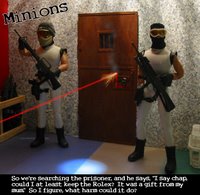At the risk of starting a flame-war, I simply can't resist responding to this recent comment here:
Found this blog through a conan site (remember the Superman III incident) and after reading a little, I am shocked at how "industrialized" writing has become. I had no idea that there was this group of mercenary writers pumping out cookie cutter stories. Not because that's what they wanted but because it paid the bills.
Are we living in the light beer age of writing? Will technology soon allow a new age of liberated authors to write great books similar to the recent explosion in microbrews?
I never fail to be amazed at the surreal and romantic notions that people have about writers, publishing and "literature" (however you want to define that last term). Publishing is a
business, and it's been "industrial" since the invention of movable type and/or the printing press.
I don't really know where the notion came from of the lonely, alcoholic writer starving for their art, chiseling their masterpieces word by painful word, stuffing the pages in a drawer for posterity.
Fact is, its very difficult to find a writer who doesn't at least
aspire to "pay the bills" through their works, even if that means publishing in obscure literary magazines to support a academic career, or taking to the lecture circuit to speak to the legions of people who would like to pretend to have read your work.
That doesn't mean I'm saying all writers are in it for the money, including myself. Sure, there are some very, very rich writers (look at J.K. Rowling, for God's sake!), but in general, there are far easier and more certain ways to get rich. Heck, there are far easier and certain ways to become middle-class. If you want money, there are better ways to go about it, and I think every writer knows that.
Most professional writers write because they
love to write, because they
have to write. It's only logical that these people try turn their inescapable obsession into some kind of paying gig. Otherwise, you have to keep a dreaded "day-job," and it cuts into your writing time.
Sell more, sell better, write more, spend less time flipping burgers. It's a pretty simple formula that's worked for a very long time. If you love to write, you hope to sell.
Of course, though the author of the comment doesn't specifically say so, I suspect they're taking a pot-shot at "tie-in" writers, people who (like me) turn out books based on existing properties and universes, comic books, computer games, TV shows, movies, etc. Ah, well, anybody in this business is used to it. We're used to being dissed, even sometimes by our fellow writers. It was exactly that situation that lead to the recent formation of the
International Association of Media Tie-in Writers, an organization created to promote and honor the writers engaged in this challenging and under-appreciated area of publishing.
Though I'm a member, I'll be honest that I don't know why it's necessary. Those of us in the business know the score, and I really don't care what the world-at-large thinks. My goal is to entertain my readers with the best book I can produce, and enjoy myself in the process. Most days I think I accomplish that. Not always, but most days. I'm content to let history sort our the literature.
Of course the implication of any such criticisms is that any tie-in book is inherently inferior in some way to any original work of literature, which is simply nonsense. Hacks don't last long in this business. And no matter how good you are as a writer, if you don't take your work seriously, if you can't put your best effort into it, then it's time to hang up your hat and call it a day.
Is one likely to find the pinnacle of 21st century literature shelved among the tie-in fiction? I doubt it, though it isn't impossible, and you'll certainly find a good number of fine and serious novels. For certain, you'll find a preponderance of enjoyable and entertaining books, many of which surpass their source material in every way.
Why do people think tie-in fiction is inferior? Well, first of all, there's the matter of its being based on existing material.
Perhaps the assumption is that the author is somehow limited or shackled by this preexisting structure. As if western literature and the novel form itself weren't a complex kind of structure to which the author is generally expected to conform. Writing with such strictures doesn't make things easy sometimes, but it's endlessly challenging and helps develop the author's skills. It can detract from the work, sure, but it can also be the annoying grain of sand that generates the perfect pearl.
As if many works of celebrated serious literature weren't derived from earlier literary works, historical figures, or characters of myth and legend. For instance, this year's winner of the Pulitzer Prize for literature, "March" by Geraldine Brooks is derived from the classic "Little Women," by Louisa May Alcott. In that respect (and admittedly, in that respect only), it differs from a Star Trek novel primarily in that it wasn't licensed or approved by the owner of the original work. Ms. Brooks just took a classic work in the public domain and used it as the springboard for her novel.
And it's even a broad generality to say that tie-in novels are automatically highly derivative. Most of my tie-in work, from Conan to MechWarrior has mainly used elements of concept and background. Virtually all the characters and their situations have been entirely original. Not all of it. The
Star Trek and Generation -X books, for instance, have used mostly existing characters, but even then, many of the
supporting characters are original to the work.
Then there's the matter that most tie-in fiction is produced under battlefield conditions. No waiting for the muse. No excuses (or none that your editor is likely to care about). No delivering a book radically different from the one you promised. It needs to be done. It needs to be done on deadline. It needs to be done to specification. It needs to fit the package we're prepared to market.
Does that hurt the quality of tie-in works? Sometimes, but less so than you'd think. Tie-in writers are, by definition, fast, and I could do a whole separate post (and I may, at some point) on the literary myth that fast means hackwork, and slow means quality. That isn't, in my experience, true at all. Sure, it's possible sometimes to push a novel too hard, to write it too fast, and that can hurt a book.
But in my experience, the natural pace of a book that's working well is pretty fast. When the book is moving slow, it's often a sign not of quality of care, but of a writer struggling with problems, or flailing around on a book they really don't understand yet. There are examples of great novels that took years or decades to produce, but I'll wager that if you could have been a fly on the wall, very little of that span was actually spent typing on the project at hand. Most was spent procrastinating, researching, throwing away false-starts, working on other projects, dealing with life, or flipping those infamous burgers.
Then there's the taint of writing "popular" fiction. Too many people like that Trek crap, so it can't be good. I'm convinced this is a legacy of the English class system. Anything attractive to the dirty masses is obviously not fit for the refined tastes of the literary upper-class.
This taint carries over to popular fiction as well, where its easy to turn one's nose up at bestsellers simply on the basis of their success. Yes, there's some pretty poor writing in the bestseller pockets at your local grocery store (though all of it is entertaining and successful on some profound level, of it would never be a bestseller). Yes, there are some books there written in a paint-by-numbers fashion that makes the most restrictive tie-in book pale by comparison. But there's also some damned fine stuff there on occasion.
If one defines literature as "works that will continue to be published, read, and appreciated long after the author is gone," (and admittedly, that's only one of many possible definitions), then I suspect that much of what will be read by future generations will filter through those best-seller lists, while other, more celebrated "literary" works fade into obscurity. It's easy to forget that Charles Dickens, for instance, was the Stephen King of his day, turning out commercial entertainments that were serialized in newspapers for the pleasure of the masses, or that "Moby Dick" was a huge bestseller, the "Da Vinci Code" of its day.
Oh, the hackwork. The bill-paying. The industry.
The horror.
There's one other element to this comment that I'm going to address separately and less formally:
Are we living in the light beer age of writing? Will technology soon allow a new age of liberated authors to write great books similar to the recent explosion in microbrews?The technology freely to self-publish via the internet has existed for over a decade. The technology to cheaply self-publish short-run print books via laser printers has existed since the 70s. I see no evidence that any of this has resulted in any flowering of literature. The creation of the blog may have made some kind of contribution to journalism and the field of non-fiction essays. But literature? The impact is virtually nil.
I think that's easy to explain. There's a misguided popular perception that the entire publishing industry and editorial process is a barrier that separates an vast and undiscovered trove of great books from their potential audiences. A single afternoon picking through the slush pile of any national publisher or magazine will quickly break you of that notion.
In fact, these institutions are a filtering mechanism, sifting through a sea of muck for the occasional fleck of literary gold, or at least somewhat impure silver.
Sure, some good stuff occasionally doesn't get published, or more rarely, a self-published book will be "discovered" and go on to major success through a conventional publisher. But I think these counter-examples say less about the industry, than about the failure of the authors to effectively and doggedly market their books. Good books are rejected every day for a zillion reasons, most of which have nothing to do with the quality of the book itself. But that doesn't mean that a good book isn't highly likely to sell
somewhere with continued effort.
Technology isn't going to "save" us from the publishing industry. The publishing industry is saving us from people who only
think they can write a book.









